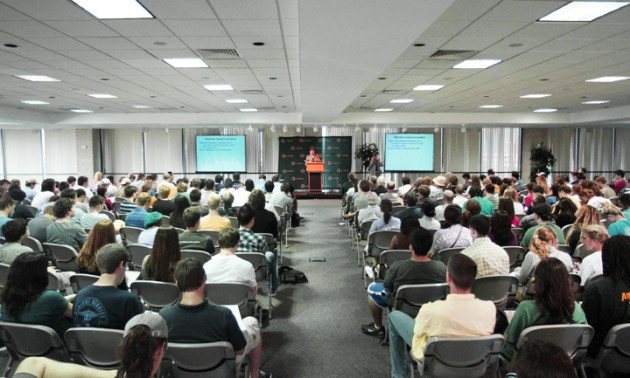
Matt Hellman | Lariat Photo Editor
By Daniel C. Houston
Staff Writer
One of the world’s most influential scholars on Islam’s impact on Middle East economics spoke before a large Baylor audience Monday, arguing certain provisions of Islamic law stifled innovation in the region for centuries.
Dr. Timur Kuran, professor of economics and political science at Duke University, said Islamic law discouraged the development of large corporations that accompanied Europe and America’s economic progress in the industrial revolution.
“In the 18th and 19th centuries — the time of the industrial revolution — it was becoming increasingly useful to be able to form large and long-lasting commercial companies,” Kuran said, “but the Middle East lacked the necessary commercial institutions, so commerce between the Middle East and Europe fell under the control of westerners. In time, the West was able to industrialize, and the Middle East could not industrialize.”
The Hankamer School of Business invited Kuran to give the lecture. Dr. Charles North, associate professor of economics, introduced Kuran and said his work was valuable in part because it corrected the misconception that the Middle East lagged behind the West due to some anti-commercial sentiment within Islam.
“Timur Kuran is a top-notch scholar and easily the world’s foremost authority on the legal and economic institutions of the Middle East,” North said. “Far from succumbing to stereotypes about Islam, professor Kuran’s research confronts the laws and the economies of the Middle East to understand why the region is the way that it is today, and why it is the way that we see it.”
Kuran said Islamic inheritance law made it difficult for merchants to keep property within the family. Inheritance law required the two-thirds of a person’s estate be granted to extended relatives, rather than a direct heir, undermining continuity in an Islamic business partnership.
Although there was technically no limit to the number of people who could cooperate in an Islamic partnership, Kuran said the vast majority of them consisted of two partners, making Middle East commerce lack the dynamic ambition of the western industrial revolution.
“The larger the partnership, the greater the probability of one partner dying during the contract period, so merchants and investors would minimize the risk by keeping their partnerships small,” Kuran said. “The risk of premature dissolution also rises with the anticipated duration of the partnership mission, so merchants and investors would limit their risks also by limiting the duration of their partnerships.”
In order to alleviate some of the inconveniences associated with partnerships, wealthier merchants invested in charitable trusts called waqfs.
Because waqfs were viewed as sacred, money invested in them was not subject to confiscation by state officials, making waqfs good ways to protect wealth successful merchants had accumulated from trade.
In addition, profits made off of investments were transferable to a person’s heirs, allowing investors to skirt Islamic inheritance laws.
But despite its benefits, Kuran said, there were broader economic drawbacks to the influence of waqfs. Because they were not self-governing, money invested in waqfs would often go toward economic projects that had long outlived their usefulness, such as taking care of roads on abandoned trade routes.
Kuran said the Middle East’s economic woes finally began to turn around in 1908 with the establishment of corporations and later in the 20th century with the creation of Middle Eastern stock markets.


